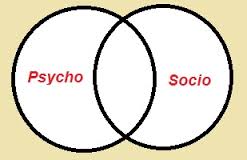 [huge_it_share id=”1″]There are two forms of Anti Social Personality Disorder. One is sociopathy. The other is psychopathy. A person diagnosed with ASPD is either a sociopath or a psychopath. What is the difference you might wonder? Does any difference really matter? Are these personality disorders caused by nature or nurture? Does it matter? In fact, one of the major distinctions between these two forms of Anti Social Personality Disorder is just that, causation.
[huge_it_share id=”1″]There are two forms of Anti Social Personality Disorder. One is sociopathy. The other is psychopathy. A person diagnosed with ASPD is either a sociopath or a psychopath. What is the difference you might wonder? Does any difference really matter? Are these personality disorders caused by nature or nurture? Does it matter? In fact, one of the major distinctions between these two forms of Anti Social Personality Disorder is just that, causation.
Sociopaths, it is now believed, are the result of environmental nurture or lack of nurture experience in young childhood. Sociopath is the term used when the antisocial behavior is a result of a brain injury or belief system and a traumatic childhood or childhood that did not provide adequate nurture. Whereas those who can be identified and diagnosed as psychopaths are now known to have a more causative learning toward hereditary – meaning nature, not nurture. It is believed, however, that both of these disorders are the result of an interaction and combination between genetic predispositions and environmental factors.
“Psychopaths are born with temperamental differences such as impulsiveness, cortical under-arousal, and fearlessness that lead them to risk-seeking behavior and an inability to internalize social norms. On the other hand, sociopaths have relatively normal temperaments; their personality disorder being more an effect of negative sociological factors like parental neglect, delinquent peers, poverty, and extremely low or extremely high intelligence.”
Anti-social personality disorder results in extremely violent acts. Though psychiatrists often consider and treat sociopaths and psychopaths as the same, criminologists treat them as different because of the difference in their outward behavior.”
Comparison chart
Psychopath |
Sociopath |
|
|---|---|---|
| Suffers from | Antisocial personality disorder (ASPD); lack of empathy or conscience, delusional. | Antisocial personality disorder (ASPD). |
| Origin of illness | Psychologists generally use the term psychopathy to imply an innate condition of the individual. It’s derived from the nature part of the nature vs. nurture debate. | The term sociopathy generally implies that environmental factors, such as upbringing, have played a role in the development of the ASPD. |
| Predisposition to Violence | High | Varied |
| Impulsivity | Varies; generally low | High |
| Behavior | Controlled | Erratic |
| Criminal behavior | Tendency to participate in schemes and take calculated risks to minimize evidence or exposure. | Tendency to leave clues and act on impulse. |
| Criminal Predispositions | Tendency for premeditated crimes with controllable risks, criminal opportunism, fraud, calculated or opportunistic violence. | Tendency for impulsive or opportunistic criminal behavior, excessive risk taking, impulsive or opportunistic violence. |
| Social relationships | Unable to maintain normal relationships. Values relationships that benefit themselves. May hurt family and friends without feeling guilty. | Tendency to appear superficially normal in social relationships, often social predators. Can empathize with close friends or family; will feel guilty if they hurt people close to them. |
(Source for above 2 quotes in italics and the chart above: diffin.com
Dr. Robert Hare interviewed about the Difference between a Sociopath and a Psychopath
Psychopaths understand, intellectually, human emotions very well. Well enough to play on them to no end and without any remorse or idea even of doing anything “wrong”. They often establish careers and hold down jobs. Whereas getting and keeping a steady job or building a career and stable home is often difficult or not possible for many sociopaths.
Psychopaths are not insane or in anyway psychotic. They do not lose contact with reality.
A high number of ever-increasing sociopaths and psychopaths do not get into trouble with the law and are not murderers or criminals and as such do live among us and present an ever-present danger in many other areas of our lives.
© A.J. Mahari – Except for noted Source copyright – December 8, 2014

